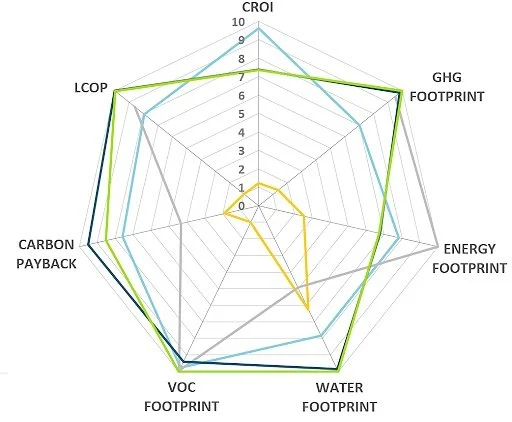Every bite of wasted food represents an incredible squandering of resources - water, land, energy, labor, and capital.
Read MoreJoin our webinar to learn about notable improvements in the dairy industry and how De Novo’s innovation is sparking the next generation of nutritional solutions.
Read MoreClosed-loop water vending machines equipped with glass bottles minimize the use of bottled water, drastically reducing plastic waste and other resources.
Read MoreThe Boundless Portfolio Analysis tool helps investors understand and clarify the risks and opportunities in each companies' sustainability strategies.
Read MoreThe Boundless Portfolio Analysis tool helps investors understand and clarify the risks and opportunities in each companies' sustainability strategies.
Read MoreA behind-the-scenes look at our proprietary Rapid-LCA methodology.
Read MoreA walkthrough of our new Scope 1&2 Emissions Calculator
Read MoreA discussion about new, healthy and climate-friendly ways to feed our animals.
Read MoreA discussion on how the timber industry and building material production will evolve throughout our transition to a green economy.
Read MoreHow Pairwise is using CRISPR technology to improve leafy green and berry harvests.
Read MoreA discussion with mainstream finance executive who are leading the way in sustainability reporting.
Read MoreSolar panels are touted for their environmental benefits and energy efficiency, but energy savings is only part of being sustainable.
Read MoreMinimize waste. Eliminate Toxicity. High performance and functionality. These are a few of the many benefits of green chemicals, which reduce the generation and use of hazardous substances.
Read MoreConventional pesticides—which generally aim to kill—aren’t the only weapons available to fight crop pests. More farmers are using biopesticides derived from natural materials such as plants and minerals. Biopesticides biodegrade in nature, won’t hurt humans, and may reverse pest-resistance caused by synthetic pesticides.
Read MoreIt’s no secret that burning fossil fuels hurts humans and our environment. By 2025, air pollution from oil and gas production is expected to cause over 2,000 premature deaths annually in the U.S. and worsen respiratory issues. Coal-fired power plants, which still operate at over 241 locations in the U.S., produce 42% of toxic mercury emissions, poisoning clean air.
Read MoreEvery day, over 60 million plastic water bottles end up in landfills and incinerators, with 86% of these bottles becoming garbage or litter. The impact of bottled water on natural resources is 3,500 times higher than tap water, and 1,400 times higher on ecosystems than tap water.
Read MoreBetween 2014 and 2019, there was an 8% annual growth in commercial construction. At the end of 2021, global revenues grew to $24,335 billion compound annual growth rate. Global energy-related construction CO2 emissions also grew to 38% due to a shift in energy sources.
Read MoreMeat substitutes produce ~60% fewer GHG emissions per pound of meat. The global meat substitute market is projected to grow significantly in the coming years. Learn more about the possibilities at our upcoming webinar.
Read MoreThe unprecedented growth of e-commerce has increased America’s dependence on long-haul trucking. Electronic tethering and autonomous trucking enable shippers to transport cargo faster and more efficiently than is possible with conventional trucks. Learn more at our upcoming webinar
Read MoreOver 35 million tons of plastic is generated in the United States each year, of which 75% tends to end up in landfills, while another 15% is incinerated. Less than 10% of all plastic waste is currently being recycled, partly due to technical and economical constraints. Alterra Energy recycles plastics through a thermochemical liquefaction process, targeting plastic waste that would otherwise end up in landfills or incinerators.
Read More



















